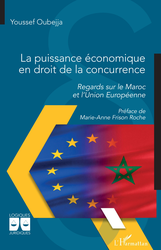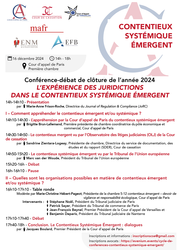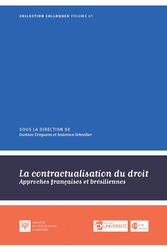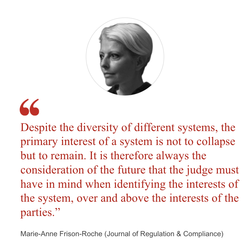The recent news

Jan. 8, 2025
Publications

🌐follow Marie-Anne Frison-Roche sur LinkedIn
🌐subscribe to the Newsletter MAFR Regulation, Compliance, Law
🌐subscribe to the Video Newsletter MAFR Surplomb
____
 ► Full Reference: M.-A. Frison-Roche, Identifying and anticipating the practice of Emerging Systemic Litigation: a necessity for organizing it , Working Paper, December 2024.
► Full Reference: M.-A. Frison-Roche, Identifying and anticipating the practice of Emerging Systemic Litigation: a necessity for organizing it , Working Paper, December 2024.
____
🎤This working paper was drawn up to serve as the basis for the speech that opened the colloquium L’expérience des juridictions dans le Contentieux Systémique Émergent, in the cycle of conferences-debates "Contentieux Systémique Émergent," which was held in French on 16 December 2024 at the Paris Court of Appeal.
____
📝It will also constitute the basis of the first contribution to the book to be published in French in 2025, Le contentieux systémique émergent (Emerging Systemic Litigation).
____
► Summary of this Working Paper : Systemic Litigation is for the moment a practice that has not been clearly identified. This is a handicap in practice, firstly because it can be confused with other things, such as the "systemic method" that this category of Litigation calls for and to which it cannot be reduced and which this method exceeds, and secondly because if this practice is not conceptualised, secondly, because if this practice is not conceptualised, even if only by a shared definition, it is difficult for the courts to organise themselves and for the potential parties to the dispute and to the proceedings to anticipate the procedural and substantive solutions that will be adopted tomorrow. The difficulty is compounded by the fact that not all emerging disputes are Systemic and not all systemic disputes are emerging. For example, banking regulation litigation and litigation concerning the operation of competitive markets or sectoral regulation are systemic disputes that are not emerging. But it so happens that technological developments have given rise to new systemic litigation, which the courts, judges and parties have had to adapt to because the systems themselves are entering the courthouses.
A series of conferences has been organised to report on this practice, focusing on technology, legislation, management, court organisation, procedure and the role of the judge.
They have thus made it possible to build up common, cross-disciplinary knowledge so that innovations can be developed and expressed in the organisation of the courts, in procedures, particularly in the relationship between judges and lawyers, and in the openness of proceedings, in the conception of the judge's office, which must be singular when the case, because a systemic is implied, is systemic. This specificity leads to judges who are less hierarchical among themselves and more specialised, leading to procedural forms that place dialogue and adversarial proceedings no longer as a desire and support but as the primary guiding principle.
____
🔓read the developments of this Working Paper below⤵️
Jan. 7, 2025
Publications

► Référence complète : M.A. Frison-Roche, préface à l'ouvrage de Y. Oubejja,, La puissance économique en droit de la concurrence, L'Harmattan Éditions, coll. "Logiques juridiques", 2025, pp.13-16
____
📝Lire la préface
____
► Présentation de la préface : une préface pouvant prendre plus de champ que ne le prend un ouvrage technique qui traite le thème de la puissance dans le cadre du Droit de la concurrence, la préface aborde le rapport entre le Droit et la puissance, qu'il s'agisse du fait de la puissance ou de la puissance du Droit, rapport dont l'examen remplit les bibliothèques et passionne les philosophes, les politistes et les sociologues.
Dans le Droit de la concurrence, construit sur la Liberté, qu'il s'agit du droit civil de la concurrence ou du droit système des marchés concurrentiel, la puissance est le levier mais devient l'objet du Droit, lorsque, jouxtant la Régulation la puissance devient un objet autonome d'intervention, soit que le passage vers l'Ex Ante se passe à l'occasion, celle d'une concentration, soit du fait d'une situation structurelle, celle d'un secteur. Le Droit des pratiques restrictives prend le gant de la puissance en le retournant par son revers qu'est la dépendance. Des remèdes à ce désir humain de dominer, il y a peu. L'information et la transparence en Ex Ante. Des sanctions, toujours des sanctions, en Ex Post. Des textes, toujours des textes.
________
Dec. 28, 2024
Law by Illustrations

🌐suivre Marie-Anne Frison-Roche sur LinkedIn
🌐s'abonner à la Newsletter MAFR Regulation, Compliance, Law
🌐s'abonner à la Newsletter en vidéo MAFR Surplomb
► Référence complète : M.-A. Frison-Roche., "Un cas pratique probatoire et procédurale difficile :🎬𝑭𝒓𝒂𝒄𝒕𝒖𝒓𝒆", billet décembre 2024.
____
🎞️voir le film-annonce
___
Il y a beaucoup de films sur les procès criminels, c'est même la majorité des situations juridiques qui ont attiré les cinéastes, surtout dans le monde britannique et nord-américain📎!footnote-3897.
On en voit moins qui ne portent que sur la preuve. Mais sur l'affiche même du film 𝑭𝒓𝒂𝒄𝒕𝒖𝒓𝒆 c'est de preuve dont il s'agit : I shot my wife. Prove it.
Ce film sorti en 2007 est de Grégory Hoblit.
La phrase reproduite sur l'affiche montre d'emblée que la preuve juridique ne relève pas que du sens commun, car s'il est "évident" que le fait a eu lieu, puisque l'auteur dit l'avoir fait, encore faut-il que dans l'espace juridictionnel, cela soit dûment prouvé, c'est-à-dire selon la procédure que le Droit impose : c'est tout le thème du film.
Car par ailleurs l'intrigue est de boulevard : un mari âgé et riche (joué par Anthony Hopkins) aime sa jeune épouse qui aime quant à elle un jeune amant qu'elle voit en cachette et auquel elle cache sa véritable identité. En rentrant d'une de leurs rencontres clandestines, son mari l'attend et lui tire dans la tête. Affaire banale, affaire simple. Le procureur-adjoint (joué par Ryan Gosling) ne prend d'ailleurs en charge la poursuite contre le mari pour obtenir vite fait/bien fait que parce qu'elle ne présente pas de difficulté : le mari a avoué l'avoir tuée, l'arme est retrouvée. Une affaire vite réglée, avant qu'il ne quitte le bureau du Procureur pour aller travailler dans un cabinet d'avocats. Enfin l'argent. Le mari a raconté au poste de police devant le policier qui a fait le constat du drame comment il a tué sa femme. Tout colle. Drame terrible, drame banal. Le procureur-adjoint va pouvoir passer à la suite, au Droit des affaires.

Mais finalement l'épouse qui a reçu une balle dans la tête n'en est pas morte. Cela ne change pas grand chose, elle est comme morte : dans le coma, elle demeure désormais dans un service spécialisé. Mais le comportement du mari est étrange, puisqu'il rejette tout ce que le Droit organise pour la protection des accusés, par exemple l'assistance d'un avocat.
Chacun se dit qu'il ne connaît vraiment rien au Droit. Le spectateur se doute que cela est une feinte et qu'il joue à ne pas le connaître, à des fins incompréhensible puisque l'aveu et l'arme le mènent à une condamnation à la perspective de laquelle il demeure passif. Pour convaincre les jurés de son incompétence technique, il fait exprès de ne pas maîtriser le vocabulaire juridique le plus élémentaire, celui que tout le monde entend dans les séries et au cinéma. Il insiste sur son ignorance de tout cela. Il montre avec insistance son inaptitude à manier le Droit. Il ne soulève pas une objection alors qu'il faut en évoquer une (le juge essaie de l'aider, l'incite à le faire, il ne le fait pas), il en soulève une à contresens. On se dit qu'il ne comprend rien à rien, c'est contrariant un accusé qui ne joue pas son rôle. Le procureur et la juge commencent d'ailleurs à être agacés, puis inquiets de voir un homme si maître de lui, riche et puissant, agir si étrangement, sentent le piège. Mais que faire contre quelqu'un qui joue à ce que l'on pourrait dire comme "à contre-procédure" ?
C'est vrai, il n'a pas fait d'études de Droit, il dirige une entreprise de construction d'avions. Il est très riche. pour se distraire, il a fabriqué un immense mobile en acier où il peut faire couler des billes qui passent de niveau en niveau selon un parcours compliqué qu'il a lui-même conçu et fabriqué. Cela ne sera que plus tard que, pensant avoir tendu un piège parfait et qu'il suffit de poser la dernière bille, il se prévaudra d'une disposition du Code applicable, sans se tromper ni sur sa teneur ni sur sa numérotation. Comme l'une des billes qu'il met dans sa machine qui gouverne les rapports qu'il établit avec ce procureur-adjoint, bille qui passe d'un niveau à un autre :

C'est donc un film sur la connaissance des faits, car tout le monde sait qu'il a tué sa femme, et sur les contraintes du Droit qui interdit que l'on traduise directement cette connaissance immédiate et commune en jugement de condamnation.
C'est parce qu'il sait cela que l'auteur de l'acte criminel va construire son piège, un piège proprement juridique, dont les billes sont le Droit lui-même, dans sa procédure et ses règles de preuve. Car il faut qu'il y ait un procès, un procureur et un juge pour qu'il puisse tirer sur sa jeune épouse infidèle et qui ne l'aimait pas, et qu'il sorte pourtant libre du tribunal.
Cela sera triomphalement avec l'acceptation du procureur qui ne pourra de jure prouver l'acte criminel, et cela sera sur l'ordre du juge.

Car l'auteur de l'acte pénalement reprochable connaît aussi les nullités de procédures et c'est intentionnellement qu'il a fait en sorte que celui qui vienne chez lui juste après son acte terrible soit précisément le jeune amant, qualité que celui-ci n'osera de lui-même par la suite révéler, mais que le criminel révéla juste au moment procéduralement opportun.
Il a encore anticipé l'application d'autres règles de procédure, qui vont les unes après les autres lier procureur et juge.
C'est dommage qu'il n'ait pas fait de Droit, la stratégie processuelle lui coule manifestement dans les veines. Pour le pire, certes.
Mais dans les veines du procureur-adjoint, aussi. Car c'est un duel de Droit et de juristes qui est mis en scène : c'est celui qui sera le plus habile, le plus fin dans le maniement des règles et des qualification qui l'emportera. Lequel ? :
Comment ?
Seuls les mauvais résumés ou articles dévoilent les raisonnements et les règles de droit finalement maniés, et leur aboutissement.
Dans ce cas pratique bien pensé, et celui de ce film l'est particulièrement, le procureur-adjoint retourne en bibliothèque et ouvre page après page des ouvrages savant pour retrouver cette règle que, même en anglais, l'on désigne, comme en Droit romano-germanique, en langue latine, lui permettra de s'extraire de la machine diabolique. De ce cas pratique, il ne sera pas donné ici la solution, cela ne serait pas de jeu📎!footnote-3898.
Mais l'on voit ici une nouvelle fois que c'est dans la qualifications que tient l'art du juriste : les études faites par le procureur le placent plus haut que l'art de l'ingénieur de fabriquer des machines à faire circuler des billes.
C'est aussi pour cela que la Justice et le raisonnement judiciaire sont intimes.
________
Dec. 16, 2024
Conferences

🌐follow Marie-Anne Frison-Roche on LinkedIn
🌐subscribe to the Newsletter MAFR Regulation, Compliance, Law
🌐subscribe to the Newsletter Surplomb, par MAFR
____
► Full Reference: M.-A. Frison-Roche, Identifier et anticiper la pratique du Contentieux Systémique Émergent (Identifying and anticipating the practice of Emerging Systemic Litigation) ; Presentation of L’expérience des juridictions dans le Contentieux Systémique Émergent (Courts Experience in Emerging Systemic Litigation), in cycle of conference-debates "Contentieux Systémique Émergent" ("Emerging Systemic Litigation"), organised on the initiative of the Cour d'appel de Paris (Paris Cour of Appeal), with the Cour de cassation (French Court of cassation), the Cour d'appel de Versailles (Versailles Court of Appeal), the École nationale de la magistrature - ENM (French National School for the Judiciary) and the École de formation des barreaux du ressort de la Cour d'appel de Paris - EFB (Paris Bar School), under the scientific direction of Marie-Anne Frison-Roche, 16 December 2024, 2pm.-6pm., Cour d'appel de Paris, Première Chambre (First Chamber).
____
🧮see the full programme of this event
____
⚙️This event has been conceived as a part of the cycle of conference-debates "Contentieux Systémique Émergent" ("Emerging Systemic Litigation"), organised on the initiative of the Cour d'appel de Paris (Paris Cour of Appeal), with the Cour de cassation (French Court of cassation), the Cour d'appel de Versailles (Versailles Court of Appeal), the École nationale de la magistrature - ENM (French National School for the Judiciary) and the École de formation des barreaux du ressort de la Cour d'appel de Paris - EFB (Paris Bar School), under the scientific direction of Marie-Anne Frison-Roche
____
► English Summary of the conference:
________

Dec. 16, 2024
Organization of scientific events

► Full Reference: L’expérience des juridictions dans le Contentieux Systémique Émergent (Courts Experience in Emerging Systemic Litigation), in cycle of conference-debates "Contentieux Systémique Émergent" ("Emerging Systemic Litigation"), organised on the initiative of the Cour d'appel de Paris (Paris Cour of Appeal), with the Cour de cassation (French Court of cassation), the Cour d'appel de Versailles (Versailles Court of Appeal), the École nationale de la magistrature - ENM (French National School for the Judiciary) and the École de formation des barreaux du ressort de la Cour d'appel de Paris - EFB (Paris Bar School), under the scientific direction of Marie-Anne Frison-Roche, 16 December 2024, 2pm.-6pm., Cour d'appel de Paris, Première Chambre (First Chamber)
____
► Presentation of the conference:
____
🧮Programme of this event:
Closing conference-debate of 2024
L'EXPÉRIENCE DES JURIDICTIONS
DANS LE CONTENTIEUX SYSTÉMIQUE ÉMERGENT
(COURTS EXPERIENCE
IN EMERGING SYSTEMIC LITIGATION)
Paris Court of Appeal, First Chamber
🕰️2pm.-2.10pm. Présentation (Introduction), by 🕴️Marie-Anne Frison-Roche, Professor of Regulatory Law and Compliance Law, Director of the Journal of Regulation & Compliance (JoRC), Scientific Director of the Cycle of conferences-debates on the Emerging Systemic Litigation - ESL)
I – Comment appréhender le contentieux émergent et/ou systémique ?
(I - How to deal with Emerging and/or Systemic Litigation?)
🕰️2.10pm.-2.30pm. 🎤L’appréhension par la Cour d’appel de Paris du Contentieux Systémique Émergent (The Paris Court of Appeal's approach to Emerging Systemic Litigation), by 🕴️Brigitte Brun-Lallemand, Première présidente de chambre coordinatrice du pôle économique et commercial, Cour d’appel de Paris (First President of Chamber, Coordinator of the Economic and Commercial Division, Paris Court of Appeal)
🕰️2.30pm.-2.50pm. 🎤Le contentieux émergent vu par l’Observatoire des litiges judiciaires (OLJ) de la Cour de cassation, par 🕴️Sandrine Zientara-Logeay, Présidente de chambre, Directrice du service de documentation, des études et du rapport - SDER, Cour de cassation (President of Chamber, Director of the Department of Documentation, Studies and Reports - SDER, French Court of cassation)
🕰️2.50pm.-3.20pm. 🎤Le contentieux systémique Eémergent vu par le Tribunal de l’Union européenne (Emerging Systemic Litigation as seen by the General Court of the European Union), par 🕴️Marc van der Woude, President of the General Court of the European Union
🕰️3.20pm.-4pm. Debate
🕰️4pm.-4.20pm. Break
II – Quelles sont les organisations possibles en matière de contentieux émergent et/ou systémique ?
(II - How to organise with Emerging and/or Systemic Litigation?)
🕰️4.10pm.-5.10pm. 🎤Table ronde (Round Table)
Moderated by 🕴️Marie-Christine Hébert-Pageot, Présidente de la chambre 5-12 contentieux émergent – devoir de vigilance et responsabilité écologique, Cour d‘appel de Paris (President of the 5-12 Chamber emerging litigation - duty of vigilance and ecological liability, Paris Court of Appeal)
Speakers:
- 🕴️Stéphane Noël, Président du Tribunal judiciaire de Paris (President of the Paris First Instance Civil Court)
- 🕴️Patrick Sayer, Président du Tribunal de commerce de Paris (President of the Paris First Instance Commercial Court)
- 🕴️Jean-François Beynel, Premier président de la Cour d’appel de Versailles (First President of the Versailles Court of Appeal) and 🕴️Benjamin Deparis, Président du Tribunal judiciaire de Nanterre (President of the Nanterre First Instance Civil Court)
🕰️5.10pm.-5.40pm. Debate
🕰️5.40pm.-6pm. 🎤Conclusion. Le Contentieux Systémique Émergent : dialogues (Conclusion. Emerging Systemic Litigation: Dialogues), by 🕴️Jacques Boulard, Premier Président de la Cour d’appel de Paris (First President of the Paris Court of Appeal)
____
🔴Registrations and information requests can be sent to: inscriptionscse@gmail.com
🔴For the attorneys, registrations have to be sent to the following address: https://evenium.events/cycle-de-conferences-contentieux-systemique-emergent/
⚠️The conference-debates are held in person only, in the Cour d’appel de Paris (Paris Court of Appeal).
________
Dec. 11, 2024
Publications

🌐suivre Marie-Anne Frison-Roche sur LinkedIn
🌐s'abonner à la Newsletter MAFR Regulation, Compliance, Law
🌐s'abonner à la Newsletter en vidéos Surplomb, par MAFR
____
► Référence complète : M.-A. Frison-Roche, "Les conditions requises pour favoriser la "contractualisation" du droit", in G. Cerqueira & A. Schreiber (dir.), La contractualisation du droit. Approches françaises et brésiliennes, Société de législation comparée (SLC), coll. "Colloques", vol. 61, 2024, pp. 435-448
____
____
🚧lire le document de travail bilingue sur la base duquel cet article a été élaboré, doté de développements supplémentaires, de références techniques et de liens hypertextes
____
► Résumé de l'article :
_______
Dec. 1, 2024
Law by Illustrations

► Référence complète : M.-A. Frison-Roche., "Mise à l'épreuve d'une affirmation "La Justice, c'est la Vérité en Action" : 🎬𝑱𝒖𝒓𝒐𝒓 #𝟐", billet décembre 2024.
🎞️voir le film-annonce
___
Dans la leçon sur le Droit et la Justice que propose Clint Eastwood dans son dernier film, 𝑱𝒖𝒓𝒐𝒓 #𝟐, une des premières scènes nous montre la procureure qui attaque et l'avocat qui défend. Ils se connaissent depuis longtemps et ce n'est pas tant le cas qu'ils évoquent, l'une pour obtenir la condamnation du suspect l'autre pour obtenir la déclaration de son innocence : ils étaient étudiants ensemble. Ils racontent le professeur qui apprit aux deux ce qu'est le Droit et la justice. L'avocat de la défense rappelle que celle qui aujourd'hui est procureure était l'étudiante préférée du Maître. Ce temps est lointain, puisque lui a sans doute moins bien réussi tandis qu'elle construit une carrière brillante et c'est en gagnant des procès qu'elle espère débuter une carrière politique sur le thème de l'ordre, la sécurité et la lutte contre la criminalité.

Lors de cette discussion entre deux juristes professionnels de la justice qui, même s'ils sont de chaque côté de la barrière chacun dans son rôle, ils se souviennent du même enseignement qu'ils ont reçu du même professeur dans le même cursus de Droit, construit sur la définition même de ce qu'est la Justice.
Le professeur avait dit :
La justice, c'est la vérité en action
C'est pourquoi l'élève préférée choisit de devenir procureure, c'est-à-dire celui qui agit pour que la Vérité se transforme en Justice : que le coupable soit appelé Coupable, que l'innocent soit appelé Innocent.
Dans cette définition toute aristotélicienne de ce qu'est le rapport entre la Vérité et la procédure judiciaire qu'y joue chacun, et notamment le procureur qui actionne l'action publique, se joue tout le film.
Et son dénouement, par lequel celle qui avait tous les moyens de transformer son office de procureure en carrière politique et qui garda en tête ce que lui enseigna son professeur à la fois ce qu'est l'appareillage juridictionnel et ce pour quoi il est fait et la façon dont chacun doit y tenir son rôle : le procureur, l'accusé, l'avocat et le juré :

Nous pouvons aussi bien regarder cette leçon de Droit et en tirer profit.
____
Nov. 27, 2024
Publications

🌐follow Marie-Anne Frison-Roche on LinkedIn
🌐subscribe to the Newsletter MAFR Regulation, Compliance, Law
🌐subscribe to the Newsletter Surplomb, par MAFR
____
► Full Reference: M.-A. Frison-Roche, "Antitrust, natural field of systemic litigation"", Concurrences, November 2024, No. 4, Art. No. 120776.
____
📝read the article (in English)
____
🚧read the bilingual Working Paper which is the basis of this article, with additional developments, technical references and hyperlinks
____
► English Summary of this article: Systemic Litigation is a specific category of Litigation in which beyond the dispute between the parties the interest of a System is involved, in particular its future. Competition Law is a natural and long-standing field for this category, which is now emerging strongly for information, climate and energy systems.
It should be remembered that a market is not self-regulating and cannot continue to function in the long term unless it has the benefit of a judge, a figure who is specific in that he/she is both external to it and yet apprehends its specific interest. In order to satisfy this double requirement, liberal legal organisations often entrust the competition authority with jurisdiction over this Systemic Litigation. Ordinary courts will also hear such cases, either on appeal or in other proceedings, and it cannot be claimed that courts are excluded, the systemic dimension of the dispute being expressed by the presence of the competition authority in the proceedings. This explains the procedural rules that are hard to justify otherwise.
The Authority, the European Commission for example, must be able to develop and express the specific interests of the competition system. This special role of the competition authority in this type of litigation, because it is systemic, has been in place for decades and should serve as a model for Systemic Litigation, which is being developed for other systems whose sustainability is now referred to the courts.
________
